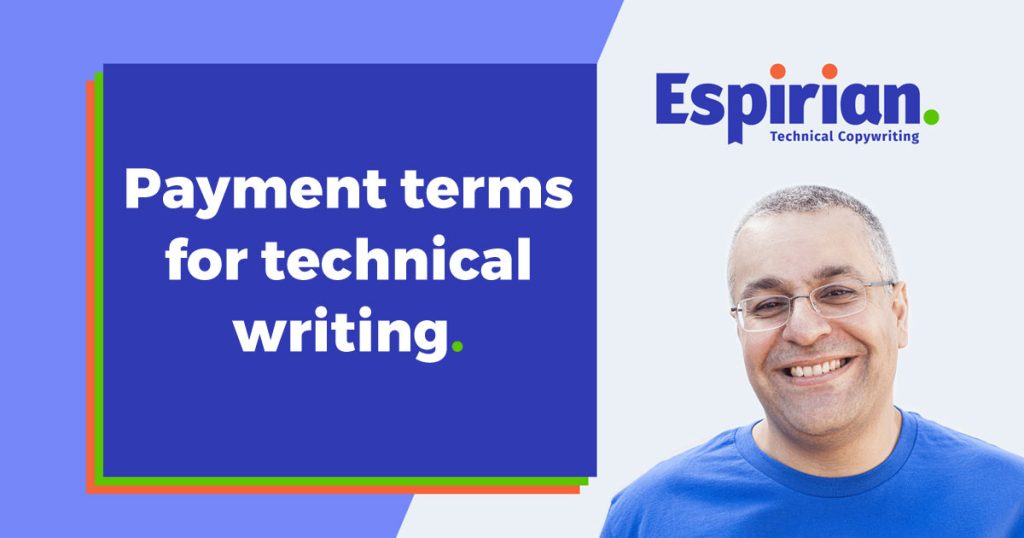How do technical writers invoice for their work? Do you need to pay a deposit? Are Purchase Orders acceptable?
If you’ve never hired a professional writer before, you’ll probably have these things in mind.
They’re the same questions my customers have been asking me since the end of 2009, so I thought I’d set out my approach here.
- Introduction
- Standard charging model for technical writing jobs
- Standard payment terms for technical writing projects
- Technical writing rates – hourly, daily and flat fees
- Do technical writers accept Purchase Orders?
- Let’s wrap up
Introduction
Technical writing jobs can often last for a couple of months or longer, and so it’s only natural for your writer to ask for something other than a one-off payment at the end of the project.
In this post, we’ll look at a standard charging model for smaller and larger technical writing projects. Ready?
Standard charging model for technical writing jobs
For projects worth less than £1000, I’m usually happy to invoice at the end of the job.
For projects worth more than £1000, I ask for:
- 50% of the fee at the beginning of the project
- 50% of the fee at an agreed date, usually 30 days after the first invoice.
For longer projects, the second invoice might come a lot later, e.g. 3 months after the first invoice.
Sometimes, more than 2 invoices may be necessary. For example:
- 1st invoice: £2000 (upfront)
- 2nd invoice: £5000 (after 30 days)
- 3rd invoice: £5000 (after 60 days)
- 4th invoice: £5000 (after 90 days)
- Total: £17,000
Like other service providers, technical writers need cash flow in their business. So, expect to pay staged invoices when hiring a writer to help you on large projects.
Standard payment terms for technical writing projects
In most cases, I ask for payment within 30 days of the date of the invoice.
This can be an issue for larger corporations, and a couple of my clients pay on 60-day terms. I can live with that but it’s one of the reasons that I ask for an upfront partial payment on most projects.
On my invoices, I include the following statement:
Terms
Payment within 30 days please. I understand and will exercise my right to claim interest and compensation for debt recovery costs under the late payment legislation if I am not paid according to agreed credit terms. [The Late Payment of Commercial Debts (Interest) Act 1998, as amended and supplemented by the Late Payment of Commercial Debts Regulations 2002.]
(That’s about as much legalese as I can stand.)
Technical writing rates – hourly, daily and flat fees
I charge all of my projects based on a flat fee, and, unless it’s a small job, I split the figure into multiple invoices depending on the size of the contract.
Despite my preference for flat fees, clients want an idea about how this translates to hourly and daily rates, so I quote those rough figures on my Pricing page.
I take a look at hourly and daily fees here: How do technical writers charge?
Do technical writers accept Purchase Orders?
Yes. Technical writers are used to working for and with large corporations, where a Purchase Order (PO) is often essential for any substantial expenditure.
So, don’t be afraid of giving your writer a PO. If they don’t know what one of those is, they might not have much experience of working with large businesses – which might not be a problem, but it’s something to be aware of.
Let’s wrap up
Technical writers need to keep their cash flow going, just as other business owners do. For small projects worth less than £1000, you may be able to pay a single amount on completion of the work.
For larger projects, expect to pay a proportion of the fee upfront, with the remainder being invoiced at an agreed date.
Each technical writer will have their own approach to charging, so make sure to check this before you agree to hire them to work on your project.
Recommended reading
- How much does technical writing cost?
- Why is technical writing so expensive?
- Do technical writers need to do research?
- How do technical writers charge?
- Pricing: a question of trust
- 12 things to look for when hiring a freelance technical writer
- 5 reasons why you shouldn’t hire me
- 16 ways a copywriter can help you


